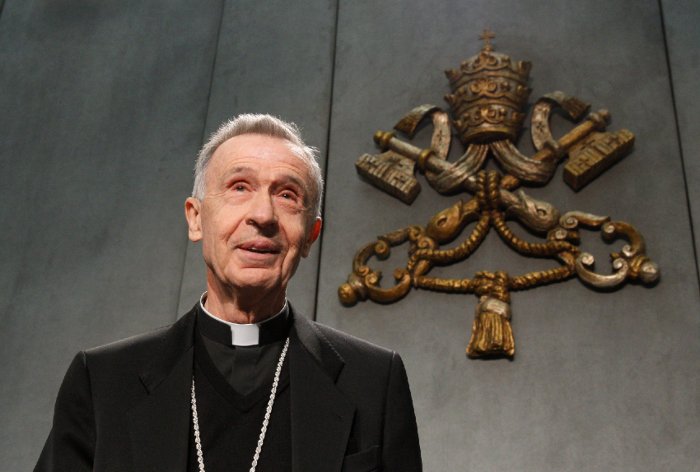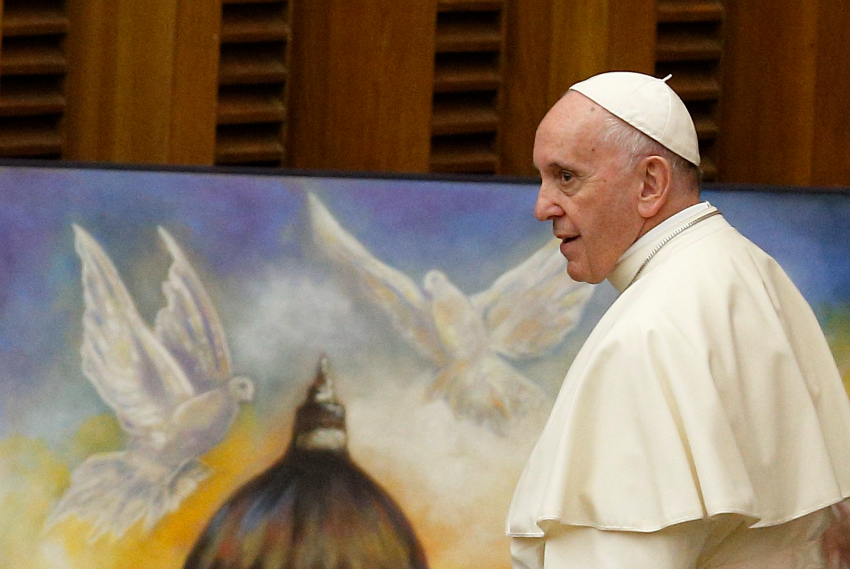“Charity is to will the good for the other.” —St. Thomas Aquinas (link)
Blessings and Censorship
As I wrote yesterday, I have been trying to study two complex controversies to try to understand better where the leaders of our Church — the Pope, the bishops, the clergy, influential lay people — intend to lead us, or try to lead us, on these complex, contested moral, and ultimately spiritual, issues.
Powerful forces in our global secular society — we might call them (just for the sake of sketching an outline) “secular globalist elites” — seem focused on having the Catholic Church alter her traditional teaching on these points. (Something which is not possible for those who wish to remain faithful and orthodox in their belief and discipleship.)
The first is the question of homosexuality. The second is the question of transgenderism.
These powerful forces I refer to seem to be well-organized groups and lobbies on the national and international level, in national and international governing structures, like the United Nations and World Bank, and these groups seem quite well-financed throughout the world. (Note: All support for these Letters is welcome…]
These influential groups seem able to use both the traditional media (television, magazines, newspapers), and the new electronic media (tweets, podcasts, email), to publish their position on these matters — and to inhibit or even block the publication or spread of any alternative position (that is, especially, to downplay the traditional Catholic position).
So the messages and arguments of these forces reach almost everywhere, to young people as well as adults, to people in both urban and rural areas, to people of all religions and none, to people on every continent… (This is why the question of censorship, of canceling access to the means of communication, becomes so important. The global communications system can allow global communication, but it can also cancel certain voices, and render them globally almost silent.)
What is the goal of this effort? Seemingly, at least in part, to persuade the global Catholic Church — a seemingly suitable religious partner for a global secular elite — to change Her doctrine and practice on these (and other) matters and, in the place of the old teachings, doctrines and beliefs — doctrine and beliefs dating back to the Church Fathers of both East and West in the early centuries, and beyond, to the Apostles and to Christ Himself, and further back, to the Hebrew prophets before Christ — to embrace the “progressive” teachings of the secularized society of our time.
The two questions I have recently focused on are:
(1) Blessings: whether Christian blessings may be extended from blessings of traditional marriages (between one man and one woman) to blessings of homosexual relationships; and
(2) Censorship: whether censorship may be rightly permitted or even required in regard to child pornography (a censorship the Russian government has recently insisted upon, link), and whether censorship on another issue, transgenderism, may rightly be contested as harmful and unacceptable in a free society (as critics of Amazon have argued since Amazon in February completely erased from its website a book critical of the transgenderism movement, so that it has become much more difficult to find or purchase the book; see this link to a February 28 article in the New York Post — the full text is also printed below).
As I wrote yesterday, my aim is to study these matters in order, amid the incessant clamor, to better understand what is the “true good” of all men and women, the men and women of our time and of all time… because wishing others to have the true good, and working so that they may have that good, or access to it, is — as St. Thomas Aquinas rightly taught — the essence of true Christian love, and thus evidently the essential calling of all disciples of Christ in this world.
Sandro’s Piece
Regarding point #1, Italian Vaticanist Sandro Magister today posted a thorough, important piece which continues and completes what I wrote in my Letter #7 (the letter I sent out yesterday); here is a link to Sandro’s piece (link). I think it is well worth reading.
In a central passage of his article, Sandro writes that there is definitely a battle occurring over the question of blessing homosexual marriages, even though the March 15 Vatican document does clearly forbid such blessings.
In other words, the Vatican made a clear, decisive statement.
But already many Catholic bishops, priests and laypeople are protesting against the statement and saying they will not abide by it, will not accept it, will not be bound by it. In this sense, the matter of blessings remains an open question — not because the Vatican was unclear, but because, as so often, the recipients of the official teaching are unwilling to hear and accept it.
In this context, the role of the Pope — as the final arbiter of disputes in the Church — becomes crucial.
But, as I indicated yesterday, the role of Pope Francis in this matter is again ambiguous. And, as I wrote, I agreed with the estimable and tireless Chilean journalist, Luis Badilla, who wrote that this situation is shameful, embarrassing, unacceptable, because, “in matters of doctrine, the hierarchy should be very, very clear.”
In this context, Sandro Magister in his piece today notes that the document published on March 15 does state that Pope Francis was “informed” and “gave his assent” to the content of the document, which says that Church cannot bless same-sex relationships.
So to this extent, Pope Francis seemed to give his authority, his support, to this document forbidding same-sex relationships.
But Sandro also notes that in this case the Pope was informed about the content of the document by the Secretary of the Congregation of the Doctrine of the Faith, Archbishop Giacomo Morandi, not by the Cardinal Prefect, the Spanish Jesuit Luis Ladaria (who is generally regarded as a “conservative,” and is clearly a very learned, well-trained, serious theologian; but here the point is not the outlook of the two men, but the fact that one was inferior and the other superior; Sandro argues that this was already a way to slightly distance the Pope from giving his full, unconditional support to this document).
Sandro writes as follows: “On previous occasions, the Pope had preliminarily given an audience not to the Secretary but to the Cardinal Prefect of the dicastery, and not simply to be ‘kept informed’ and ‘give his consent to the publication,’ as in this case, but for something more exacting: to ‘approve,’ meaning to make the decision his own, and to ‘order’ that it be published.”
Sandro continues: “The official bulletin of the audiences shows that Congregation Secretary Morandi was received by Francis on January 28, while Cardinal Prefect Ladaria was last received on March 18, three days after the publication of the Responsum, when the rebellion against the ban had broken out.”
And Sandro adds: “In reality, the rebels were not so much taking aim at Francis himself. They were rather hurling their darts against the Congregation for the Doctrine of the Faith, the Vatican, the ecclesiastical institution. Implicitly, as on other occasions, they tended to separate the Pope from the Curia and to exempt him from direct responsibility.”
In Sandro’s interpretation, the battle now is for the Church Herself, for the institution of the Church as a visible body with a clear and united teaching worldwide.
Then Sandro looks at the question of the Pope’s next action: his Sunday Angelus on Sunday, March 21, five days after the publication of the document of the CFD on blessings.
Sandro writes: “And he? [that is, Pope Francis] It was like he was in on the game. At the Angelus on Sunday March 21 he added a couple of glosses to the text he was reading, to mark his distance from those clerical, elitist rigidities and aridities that are his habitual target, as a Pope who is on the side of the people against the institution.”
Then, Sandro gives us the actual text of the Pope’s Angelus address. And he separates the words that were prepared by the Vatican staff from words Pope Francis added extemporaneously as he gave the Angelus address this past Sunday at noon in Rome:
Sandro writes: “Here is the passage with the words that Francis added off the cuff underlined:
“It means sowing seeds of love, not with fleeting words but through concrete, simple and courageous examples, not with theoretical condemnations, but with gestures of love. Then the Lord, with his grace, makes us bear fruit, even when the soil is dry due to misunderstandings, difficulty or persecution, or claims of legalism or clerical moralism. This is barren soil.”
Sandro sums up (and this is the important point): “The result of this allusive distancing of the pope is that from this point on the Responsumagainst blessings of homosexual couples will be considered by many as a mere ‘opinion,’ exactly as defined right from the start by the president of the German episcopal conference, Limburg bishop Georg Bätzing.”
Sandro then goes on to describe how Pope John Paul II acted in 2001 after the publication of Dominus Iesus [“The Lord Jesus”] which met with sharp criticism in progressive circles because it focused so uncompromisingly on Jesus as the one Lord whose mission was to save mankind. But you can read how John Paul acted at this link to Sandro’s piece.
Regarding Point #2, here below are two articles which may prove useful in interpreting and evaluating the growing tendency toward the censorship of books, articles, images and videos on the internet and in the global economy. —RM

Above, Cardinal Luis Ladaria, Prefect of the Holy See’s Congregation for the Doctrine of the Faith. The Congregation issued a text on March 15 which said the Church has no power to give blessings to same-sex relationships. The text was immediately sharply criticized in many parts of the world, including by a number of bishops and priests
Amazon turns from book-seller to censor by dropping transgenderism book
By New York Post Editorial Board
February 28, 2021 — In a new and deeply troubling twist on Big Tech’s power, Amazon has decided to quietly squelch a book on transgenderism. Last week, the virtual marketplace stopped selling Ryan Anderson’s 2018 book, When Harry Became Sally: Responding to the Transgender Movement, which offers a scholarly analysis of transgenderism that questions politically correct sacred cows.
In particular, it shares the stories of adults who were encouraged to transition as children — and later greatly regretted those irreversible alterations.
This follows Amazon’s move to deny service to Parler as that social-media site was growing popular with righties as an alternative to censorship-prone Twitter.
Amazon now controls an astounding 83 percent of US book sales, and its guidelines say that “providing access to the written word is important, including content that may be considered objectionable.”
Its exceptions to that policy include hate speech and sexual exploitation of children, but neither explains why a book making perfectly legitimate points suddenly vanished after three years on the site.
Was it just that the House was passing the Equality Act, which expands anti-discrimination protection for transgender people to controversial areas like sport?
A group of senators including Marco Rubio wrote Amazon boss Jeff Bezos asking why “Amazon has unabashedly wielded its outsized market share to silence an important voice merely for the crime of violating woke groupthink.”
Typically, the tech giant reaches out to publishers or authors before taking action against supposedly offensive content.
But Anderson, who is president of the Ethics and Public Policy Center, still has yet to hear why his critically acclaimed work got squelched. Yes, you can still buy the book.
But Big Tech won’t make it easy for you.
[End, New York Post article]
Here below is an article about efforts being made by the government of Russia to control — censor — certain pornographic materials that circulate on the internet, in order to protect the Russia people, especially children, from these materials.
In this case, Russia seems to be practicing a type of “censorship” that protects its young people from abusive and harmful media.
Link: https://tass.com/economy/1269283
Russian News Agency TASS
March 23, 2021
Only third of prohibited content removed by Twitter, Russian watchdog says. The watchdog will continue to insist Twitter remove prohibited and dangerous information completely
MOSCOW, March 23. TASS. — Twitter has removed only a third of content prohibited in Russia, Russia’s mass media watchdog said on Tuesday.
Roscomnadzor (the Federal Service for Supervision of Communications, Information Technology and Mass Media — TASS) informs that after it took measures to slow down Twitter traffic on March 10, 2021, the social network began to remove prohibited content but actually has removed only a third of prohibited content with child pornography, materials pushing children to suicide, advertising the production and use of drugs. … The pace of deleting such information is unsatisfactory,” it said.
“Two thirds of materials harmful to children are still accessible on Twitter. Moreover, regrettably, new posts with child pornography, suicide propaganda, information about the use of drugs continue to appear, which is absolutely inadmissible. Roscomnadzor will continue to insist Twitter remove prohibited and dangerous information completely and the soonest possible,” it stressed.
On March 10, Russia’s media watchdog announced it was launching an “initial slowdown” against Twitter’s loading speed in Russia because the service had ignored repeated federal requests to remove nationally prohibited content.
The federal regulator vowed to continue these measures against the social giant even going as far as blocking it.
Vadim Subbotin, the watchdog’s deputy head, told TASS that the service would block Twitter in Russia in a month if the latter failed to delete the proscribed information.
[End, TASS article on Twitter content being censored in Russia]

Above, Pope Francis. The 8th anniversary of the inauguration of his pontificate came five days ago, on March 19. He was installed on March 19, 2013, after being elected on March 13, 2013 at the age of 76. He is now 84.
As a special thank you to readers of The Moynihan Letters, we would like to offer you the opportunity to pre-order Finding Vigano: In Search of the Man Whose Testimony Shook the Church and the World. With your purchase, you will receive a complimentary one-year subscription to Inside the Vatican magazine. Yes, order a book, and get a free 1-year subscription to our fascinating monthly magazine.






Facebook Comments